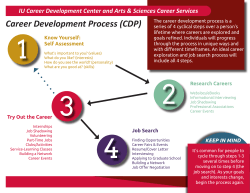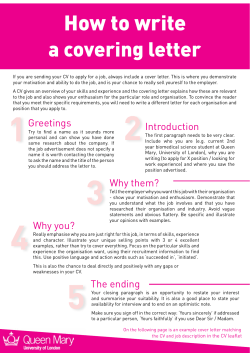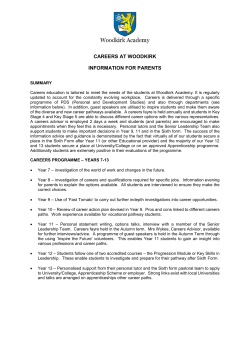
Career Connect Newsletter
Careers Guidance and Inspiration in Schools: Statutory Guidance for Governing Bodies, School Leaders and School Staff The Department for Education has launched the revised version of Careers Guidance and Inspiration in Schools: Statutory Guidance for Governing Bodies, School Leaders and School Staff (DfE, 26th March 2015). This new version of the statutory guidance replaces the April 2014 edition. The guidance has been rewritten and strengthened in a number of important ways to reflect the change in direction of policy since last year. The Key Differences to the Statutory Guidance: The new guidance emphasises the value of improved careers services, which include high quality, independent and impartial careers guidance and the provision of face-to–face advice and guidance from a range of sources, particularly from qualified career professionals, as principles of good practice to help prepare young people for employment and employability. The guidance also stresses the need for schools and colleges to have a strategy for careers guidance. These are key points previously tabled in the statutory guidance from April 2014 (Para 17, p.7. in the 2014 guidance) and are now highlighted for schools and colleges senior leadership. Careers and Enterprise Company An additional section of the guidance explains the role of the new Careers and Enterprise Company. It claims that the new company will ‘transform careers and enterprise provision for young people and inspire them about the opportunities offered by the world of work’. This is described as a brokerage service between employers and schools and colleges. Paragraph 40, p.11: Helping pupils to access information on the full range of education and training options and engage with other local learning providers There is a strong emphasis that schools with post-16 pupils should pay attention to the new study programmes and that pupils are made aware of the progression routes they can pursue after the study programme they are following. Paragraph 42: p.12: Post 16 Opportunities Database ‘Schools should also encourage pupils to use websites which display information about opportunities (“portals”)’. From October 2015, the Government plans to make information on the full range of post-16 opportunities available via a national 1 database. Further information, is available via the link below to the Operational Guide, published on 24th March 2015. https://www.gov.uk/government/publications/post-16-courses-database-operationalguide Paragraphs 61 -64, p.15. : Ensuring adequate support for pupils with special educational needs This section strengthens the guidance to schools on ensuring appropriate support for students with Special Educational Needs and Disabilities. It says that ‘...Young people with special needs and disabilities are capable of sustainable paid employment, with the right preparation and support’….‘Independent and impartial advice for young people with SEN and disabilities should include all of the education, training and employment opportunities on offer, and signpost them to study programmes that will support their transition into paid employment. This includes supported internships for young people with Education Health Care Plans (EHCP), traineeships and apprenticeship; and qualifications that will enable young people to study higher education, where appropriate’. The new guidance recommends schools make use of the local offer of SEN provision published by local authorities, ‘who have an important role to play, in particular through the provision of SEN support and EHCP.’ Reference is made to the 0-25 Special Educational Needs Code of Practice. Paragraph 67, p.16: Evaluation and monitoring of advice and guidance This is the most noteworthy change in the new guidance. One of the most important additions is a far stronger section on the concern for quality. In developing careers provision for students, there are currently three aspects of quality assurance that schools should take into consideration: The quality of the school careers programme. The Government makes the recommendation that all schools should work towards a Quality Award for Careers Education, Information, Advice and Guidance as an effective means of carrying out a self-review and evaluation of the school’s programme. The national validation, the Quality in Careers Standard1, will assist schools to determine an appropriate quality award to pursue. There are currently twelve quality awards that are recognised as meeting the Quality in Careers Standard. The quality of independent careers providers. The recognised national quality standard for information, advice and guidance (IAG) services is the matrix Standard. To achieve the Standard, organisations will need to demonstrate that they provide a high quality and impartial service. Schools can access an online register of organisations accredited to the matrix Standard. 1 Career Connect hold the national validation, the Quality in Careers Standard 2 The quality of careers professionals working with the school. The Career Development Institute has developed a set of professional standards for Careers Advisers, a register of Advisers holding postgraduate qualifications and guidelines on how Advisers can develop their own skills and gain higher qualifications. The main qualifications for Careers professionals are the Qualification in Career Guidance (QCG), which replaced the earlier Diploma in Careers Guidance, and the level 6 Diploma in Career Guidance and Development2. 2 Career Connect’s Quality and Workforce Development Team offer both of these qualifications. 3
© Copyright 2025








